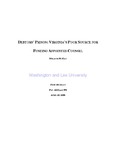Debtors' Prison: Virginia's Poor Source for Funding Appointed Counsel

View/
Author
McKay, Melanie
Subject
Washington and Lee University, Shepherd Poverty Program
Legal assistance to the poor
Public defenders -- Costs
Poverty
Due process of law -- U.S. states
Lawyers -- Fees -- U.S. states
Metadata
Show full item recordDescription
Melanie McKay is a member of the Class of 2008 of Washington and Lee University School of Law. Capstone; [FULL-TEXT FREELY AVAILABLE ONLINE] Virginia statute provides for “repayment of representation costs by convicted persons” as part of the cost of prosecution, which is typically assessed by the court as part of sentencing. Payment of these costs is one of the conditions of probation that make up nearly every sentence issued by state courts. This means that defendants who do not pay their court costs will go back to jail. Because the court has already determined that the defendant is poor enough to qualify for an appointed attorney in the first place, it is seldom the case that a few days or months in jail will change the defendant's financial situation in any way that facilitates paying such costs. Thus, court mandated reimbursement begets probation violation, which leads to increased jail time, lost wages or lost employment, and further delinquency in payment.
Virginia's practice of jailing criminal defendants because of their poverty is ripe for reevaluation and revision or elimination. It should be unconstitutional under the Sixth and Fourteenth Amendments of the United States Constitution and forces appointed attorneys onto ethically questionable ground. Further, it increases court expenses without increasing the likelihood of recovering those costs. It also leads to an unnecessarily increased probability of probation violation. Finally, the policy places undue hardship on impoverished convicted criminals, decreasing the likelihood of rehabilitation. [From No "Free Lunches" in Virginia] Melanie McKay